Does It Cost Money To Close A Bank Account
The truth about the death of cash
(Image credit:
Getty Images
)
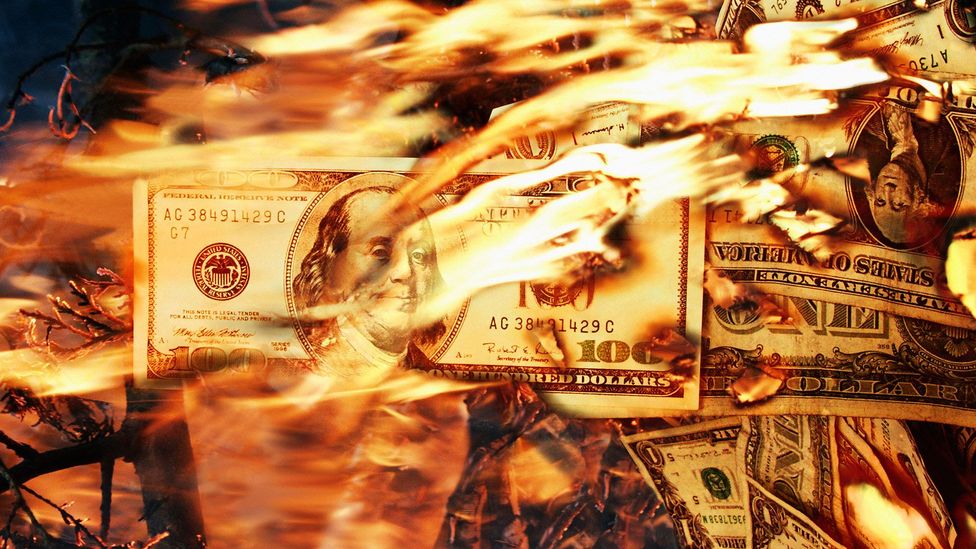
Will cash disappear? Many technology cheerleaders believe so, but as Rose Eveleth discovers, the truth is more complicated.
I
It's a hot summer day in 2025 and you're wrapping up a long meeting at the office. Several of your colleagues have attended the meeting from home, their faces and bodies projected as holograms into seats at the table. But you came into the office, and were rewarded with a nice array of meeting snacks – slices of lab-grown salami and grapes. Afterwards, you step out of the office to grab some fresh air and a coffee. On the street the cars are driving themselves, and people with internet connected retinal implants walk past, checking the scores and their stocks as they go.
You order a latte with soy milk – the only kind of milk that's affordable any more after the collapse of the dairy industry. You reach into your wallet, and pull out a few bills, folded and slightly crumpled on the edges, smoothing them before you feed them into the robot barista's money slot.
Wait. Crumpled bills? Isn't this supposed to be the future? Nobody is going to use cash in 10 years, right?
Not quite. It's tempting to forecast the demise of cash. In fact, people have been predicting the end for physical money for nearly 60 years. With the rise of credit cards, contactless payments and cryptocurrencies like Bitcoin the death knells have only gotten louder. It may seem like physical money could soon be a thing of the past, but if you take a closer look at the evidence – and the intriguing psychological relationship we have developed with notes and coins – you'll find that it's a bit premature to predict cash's disappearance.
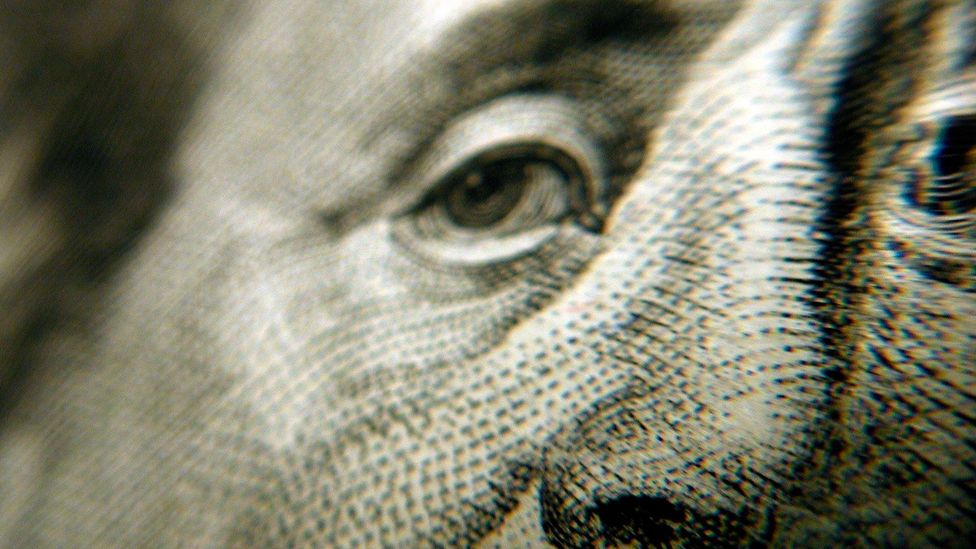
In the US, cash in circulation grew 42% between 2007 and 2012 (Credit: Getty Images)
Physical money has been with us for thousands of years for a reason. Cash is essentially untraceable, it's easy to carry, it's widely accepted and it's reliable. If the power goes out, or there's a blip in the electronic systems that make the online commerce world go round, cash is there. If someone wants to buy something without anybody tracing it back to her, cash is the way to do it. If someone wants to be certain that their form of payment will be accepted, cash is the best bet. Even with advances in technology, some of the aspects of cash simply aren't reproducible with bits just yet.
There is simply no alternative system of payment that is as convenient, reliable and anonymous. Bitcoin is anonymous, but currently unstable and inconvenient. Credit and debit cards are widely accepted, but they instantly connect your purchases with your person. Peer-to-peer payment systems like Paypal or Venmo require apps and accounts, and are still easily traceable.
Then there's the question of global reliability. In the case of American money, cash has value beyond the borders of the country. In fact, two thirds of cash holdings in American dollars exist outside the country. People store up cash for emergencies, to keep a safety net, and to ensure that whatever happens, their wad of cash will be there for them.
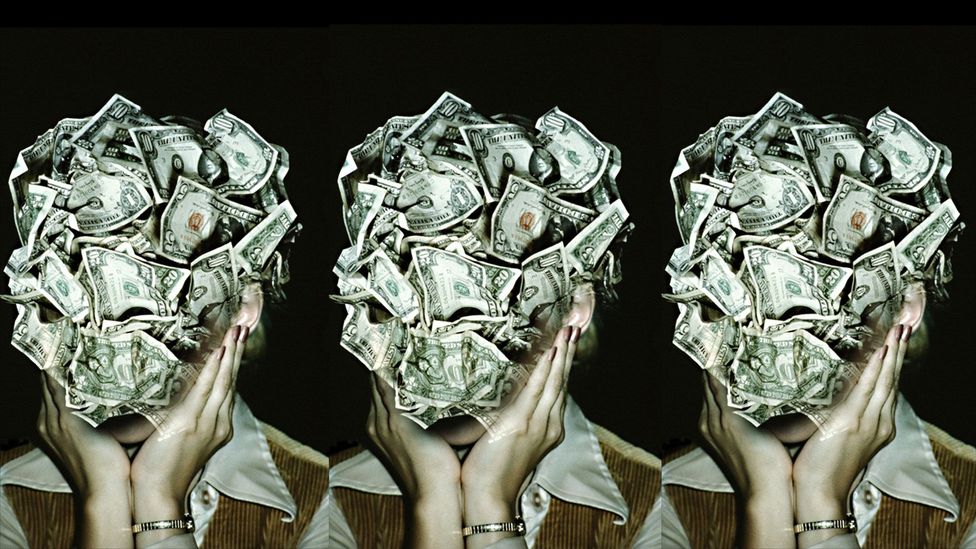
Is cash really on the way out? (Credit: Getty Images)
While technology is trying to design a system that has all the components that cash does, it's simply not there yet. Which is why, when you look at the statistics we have on cash use around the world, paper and coin isn't doing too badly after all.
Number crunching
It's difficult to put a number on just how much cash is used day-to-day across the globe. One of cash's key attributes is how hard it is to track. Still, the data that does exist gives us a glimpse.
The first way to estimate cash use is to calculate how much of it is in circulation. By this measure, cash is far from disappearing. In the United States, cash in circulation grew 42% between 2007 and 2012, and the amount of American money floating around in bills and coins is expected to grow by about 5% each year. The average growth globally is 7% per year, according to Eric Ziegler, President of the Security Technologies Group at Crane Currency, which manufactures notes.
However, that's not the same as how much cash is actually changing hands in daily transactions. "Nobody has a way of going into the economy and counting how many bills are out there and the value of those bills," says Daniel Wilson, an economist with the Federal Reserve Bank of San Francisco. "We don't know exactly how many cash transactions are occurring on any given day."
To get some sense of how cash moves, economists design models and surveys. In the Netherlands, for example, economist Nicole Jonker and her team at the Dutch National Bank conducted something called a diary study, in which they asked participants to write down a day's worth of transactions, both cash and non-cash. From there, Jonker and her team built a picture of the how Dutch people were buying things.
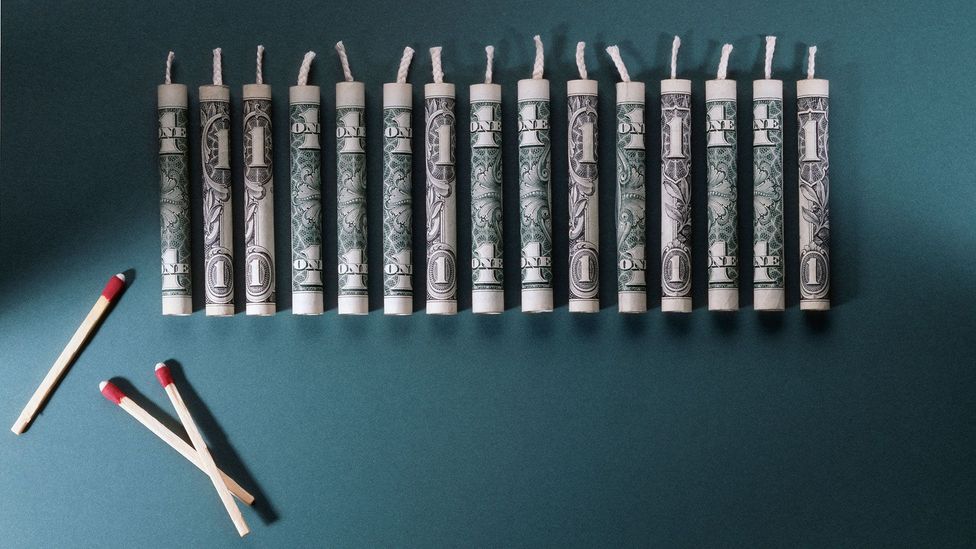
Many have suggested that digital payments will lead to the end of cash (Credit: iStock)
The Netherlands is an interesting case study to look at more closely, because their retail sector has recently embraced card payments in a big way. There are now 1,400 supermarkets in the Netherlands with registers that don't accept cash.
As a result, card payments in the Netherlands have been growing by about 8% annually over the past few years. And yet, cash is still king. In 2012, there were 2.7 billion card payments, but an estimated 3.5 to four billion payments were made with cash. "Even in supermarkets which all accept debit cards, cash is still used heavily," Jonker says. "For the time being we think cash will keep on having an important role."
Studies of other nations tie in with these findings. In the UK, half the transactions by consumers in 2013 were with cash, according to a report released in May by the UK Payments Council (now known as Payments UK). "The current forecast is that this figure will drop below 50% next year (2016), but there is no prediction for cash to disappear," the report reads.
And one study that rounded up surveys like Jonker's from around the world found that, in the seven countries they looked at — Australia, Austria, Canada, France, Germany, the Netherlands and the United States, 46-82% of all transactions in 2012 were conducted using cash (a wide range that may reflect both the uncertainty in the survey methods, and the variability between nations).
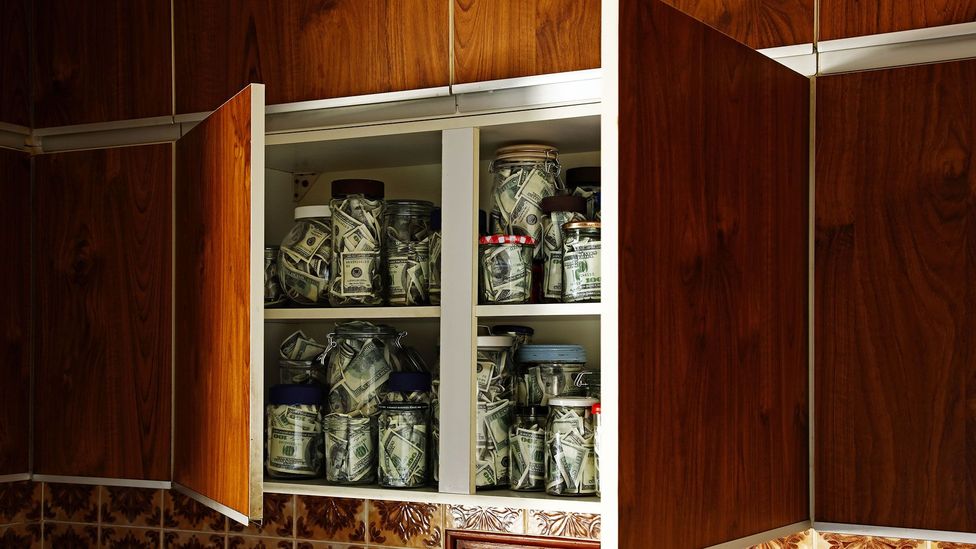
Some like cash because it is anonymous and can be squirrelled away (Credit: Getty Images)
Even countries that are often held up as the leaders of a cashless crusade, such as Sweden and Denmark, aren't really getting rid of notes and coins. In June of this year, there was a round of headlines declaring that Denmark would rid itself of cash by 2016. "Burn your bills: Denmark wants to go cashless by 2016," the headlines read. Not even close, Rene Thomsen, manager at the Danish Bankers Association told me. "I think, there's been some misunderstanding on what the Danish proposal really is," he said. In Denmark, he explained, there is currently a rule that all shops must accept cash. This new proposal would let some shops get around that rule. That's all.
"It's difficult to say, but I would be very surprised if we didn't have cash in 10 to 15 years," he says. "It's hard to imagine that within 10 to 15 years that it's not possible to go into a bank and say 'I would like $1,000 and I want it in cash.'"
Irrational urge
Perhaps cash's sticking power has something to do with our strange relationship with notes and coins. As with most of our decisions and preferences, our affinity for cash isn't entirely rational. People value cash differently than they value electronic money, even though the two have the exact same value. Psychologist Eric Uhlmann, from the Paris School of Management, has done a handful of studies that picked apart how differently people feel about different kinds of money. "I'm interested in human intuition and economic irrationalities," he says. "There's this sort of irrational feeling that if money is physical, it's more yours, and you feel like you own it more. If you touch a dollar more, then that particular dollar becomes yours."
Uhlmann tested these ideas by presenting a set of scenarios to participants. In one, they were told a story about Ted and Donna. Forty years ago, the story goes, Ted's great-grandfather stole $1,000 from Donna's great-grandfather. Ted eventually inherited that money. In one scenario, Ted inherited the actual money – a wad of bills in a box that his great-grandfather passed down to him. In the other scenario Ted's great-grandfather deposited that money into Ted's bank account. When Donna finds out that Ted has the money, she asks for it back.
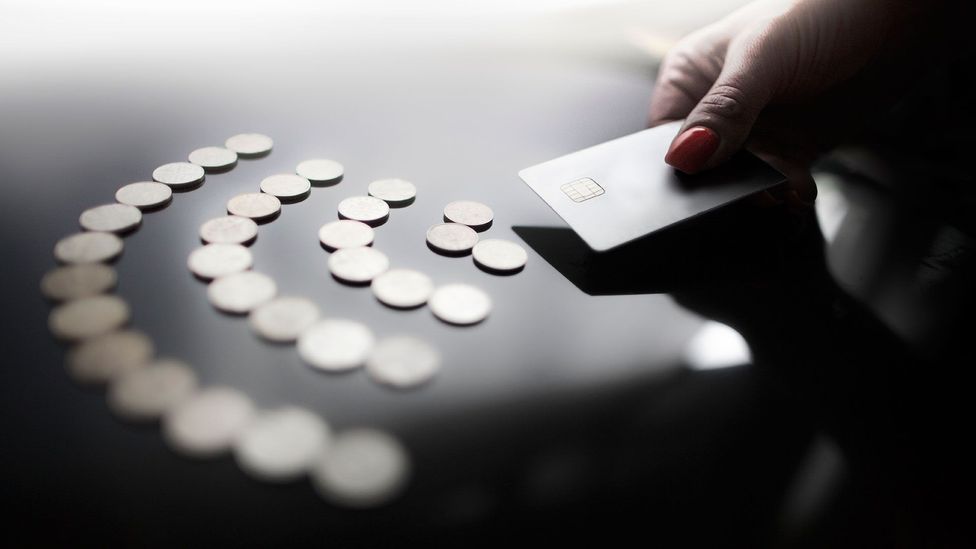
Contactless payment is here but it's unclear yet how it will impact cash use (Credit: iStock)
Participants were then asked whether Ted should give the money back to Donna. Those who heard the story with the physical money, in which Ted had a box of bills, were more likely to say that he should give Donna the money back. Participants who heard the story in which the money lived in Ted's bank account, rather than a box, were more likely to say that Ted no longer had "quite the same" money that had been stolen, and were less inclined to force Ted to hand it over.
This kind of thinking applies not to just dollars in a box, but larger questions of theft and justice as well. Another researcher has done studies showing that people feel less negatively about white-collar crime, where people aren't stealing physical things, than they do about blue-collar crimes in which an object is taken. Another study found that people cheat more when they're cheating for tokens, than when they're cheating for actual money. If you leave a Coca-Cola out, people are far more likely to take it than if you leave a dollar.
Of course there are limits to these effects. "If your bank subtracts money from your account, you'd still feel stolen from," Uhlmann says. But when the two amounts are the same, there is a clear difference in how we feel about physical money compared to its digital proxy. "It says something really interesting about the human mind," he says, "and the difficulty that we have being logical despite our rational beliefs."
Could that mean that we might resist giving up cash entirely? There's some evidence that suggests so. In the US, there has been a backlash against abolishing pennies – despite being worth less than they cost to produce, some Americans aren't ready to part with the coin. Over in Australia, talk of abolishing the five cent coin was met with concern over the loss of income that charities receive from small change, and potential consumer backlash over rounded-up prices.
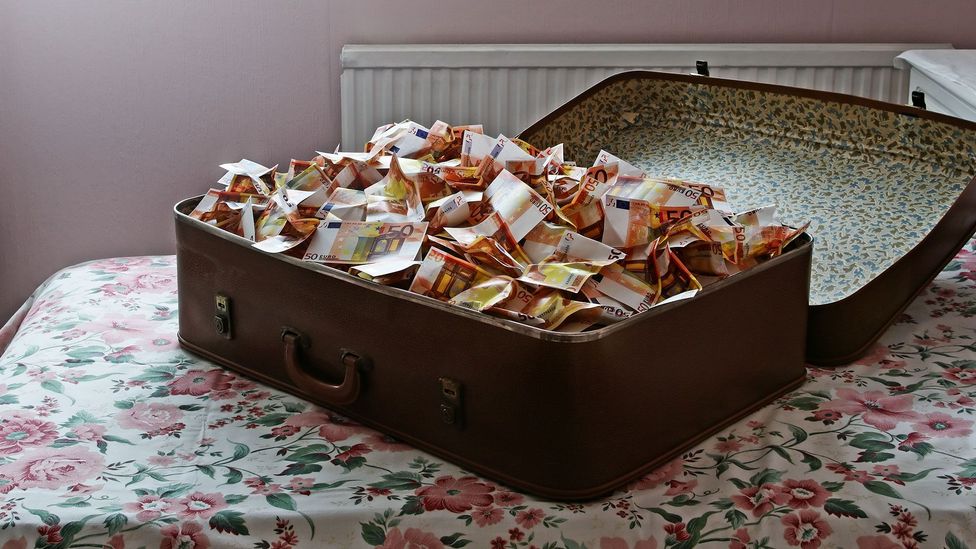
In 2012, between 42-80% of transactions were in cash, depending on the country (Credit: Getty Images)
History also suggests that there is a safety and security we feel about cash that digital currencies can't quite match. Anybody who's seen Mary Poppins knows the chaos that can happen when there's a run on the banks. When there's a financial crisis, people would rather have their money in hand, than behind the teller's window or in the cloud.
It's possible of course that developed Western countries like the US may be more attached to cash than elsewhere. "Different cultures have different attachments to their currencies," says Nicolas Christin, a researcher at Carnegie Mellon University, "and as far as the US is concerned there's a strong attachment." Christin argues that's because in the US the national currency has been relatively steady, where other countries have seen periods of boom and bust in the value of their money. This might make Americans more attached and trustworthy of their bills than other people.
The mobile caveat
While most conversations about the future of technology might myopically focus on America and Europe, some of the greatest innovations in money aren't coming from either place. In some developing countries, cash transactions are quickly being replaced by digital payments, powered by mobile phones.
While in the US, you still might buy your coffee with cash in 2025, that might not be the case in Kenya. In 2007, Kenyans began to adopt a system called M-Pesa and today it is used by over 17 million Kenyans, over two-thirds of the adult population. Users top-up their accounts and transfer money by sending a text message; the recipient then takes their phone to a vendor to get their money. No banks are involved.
"Kenya has done mobile payments better than anyone," says Benjamin Mazzotta, a researcher at Tufts University who studies cash use. "M-Pesa is now accepted not just for large transfers, but for meals and clothes and school tuition. You can do lots of things with M-Pesa today that five or 10 years ago would have sounded like Neverland."
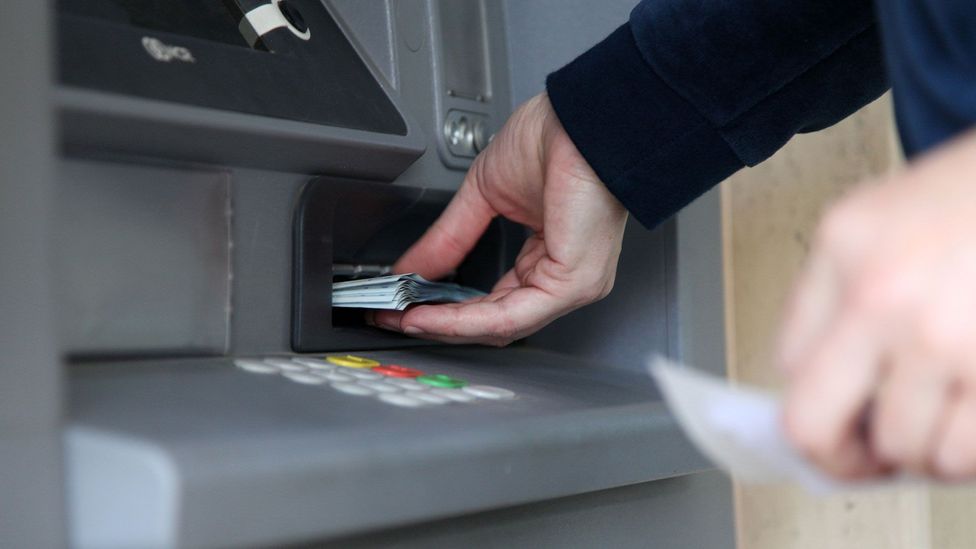
The ATM remains ubiquitous (Credit: Getty Images)
Still, in places like the US and Europe, a system like M-Pesa might have a harder time catching on. Much of the technology's success is due to the fact that it's run by Safaricon, the country's largest mobile-network operator by far. In other countries, competition is stronger: if each operator chooses to introduce their own proprietary form of mobile payment, it might not be anywhere near as convenient and seamless.
Take the Apple Pay system for example. Apple has faced hurdle after hurdle in getting the system adopted both in the United States and elsewhere. They've struggled to cut deals with places like China, where one company controls transactions between banks.
And it's worth remembering that M-Pesa is a system for moving cash around, not a system to eliminate it. Users still hand cash to the M-Pesa vendors to top-up their accounts, and retrieve cash from them when money is sent to them.
So, while tech evangelists might like to believe they can replace global use of cash with digital transactions or Bitcoin, the truth is a bit more complicated and the hurdles aren't all fixable by technology alone. Our psychological attachment to money, the infrastructure available to banks, and the need to create systems that are compatible with lots of vendors and users, all make progress away from cash more of a slog than a sprint.
Money makers
When you ask those who actually make currency whether they lose sleep over the looming cashless future, they say they're not worried. "Frankly, based on the continued growth rate of cash, we don't anticipate the disappearance of cash in the possible near term, or even medium term," says Eric Ziegler at Crane Currency, a money design and manufacturing company. He doesn't think Crane even has a cashless contingency plan, nor that they need one.
Of course, saying that cash isn't going away isn't the same as saying cash is going to look the same forever. Banks and printers are constantly engaged in the fight against counterfeiters – a fight that goes all the way back to the 4th Century BC. And our future money will probably be a lot more digital than it is now.
Manufacturers like Crane are developing futuristic bills that involve large, easy to recognise security features. According to Ziegler, the best security features are the most obvious ones. "You want it to be technologically advanced, but so easy and obvious that if it's missing the average cashier isn't going to miss it," he says. For that reason, he says, future money will likely continue to feature portraits and heads. Not just because we love to memorialise people, but because portraits are also a great way to challenge counterfeiters because as humans we're good at recognising irregularities in faces. "If the hair is slightly different, or the glasses are off, we notice," says Ziegler. "Portraits are a great security feature."
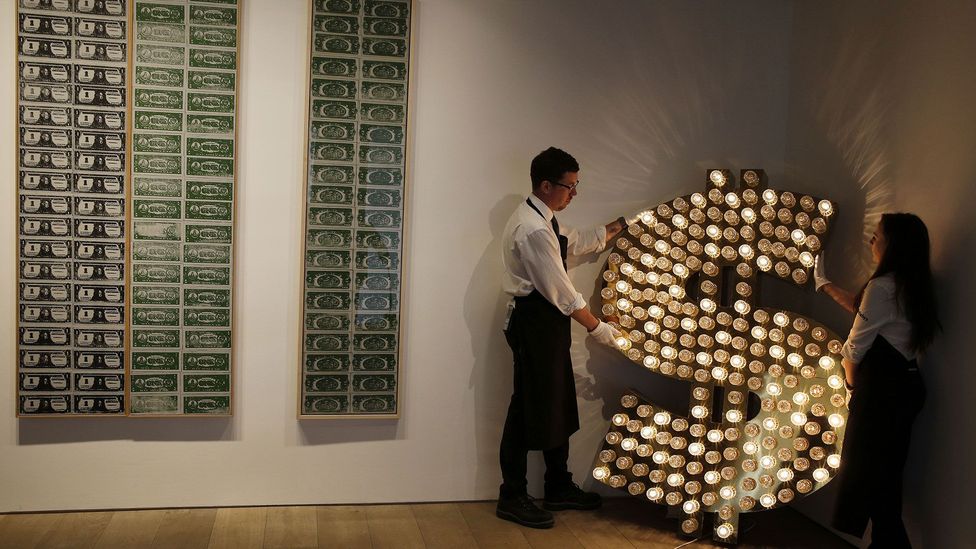
Could cash one day only be found in museums or galleries? (Credit: Getty Images)
Beyond creating new bills with advanced security features, others are toying with the idea of slapping the digital world right on top of the physical one. In 2001 the European Union considered adding an RFID chip to each bill, largely in response to a huge number of counterfeit euros discovered in Greece. They ultimately rejected the idea, as it would increase the cost of producing bills dramatically, but according to Christin, future money might be full of these kinds of digital elements. In fact, it's not the technology that's missing, Christin says, it's the infrastructure. An RFID chip is only useful if someone has an RFID reader to scan it with. "Think about the guy on the beach in Thailand who wants to rent a surfboard," says Christin. "Do you have all the infrastructure you need to use that technology there?"
"It's not that the technology doesn't exist," he adds, "it does, it would just cost a lot of money and be hard to deploy universally." In other words, the exact challenges that face digital currencies are what make digital additions to cash so difficult.
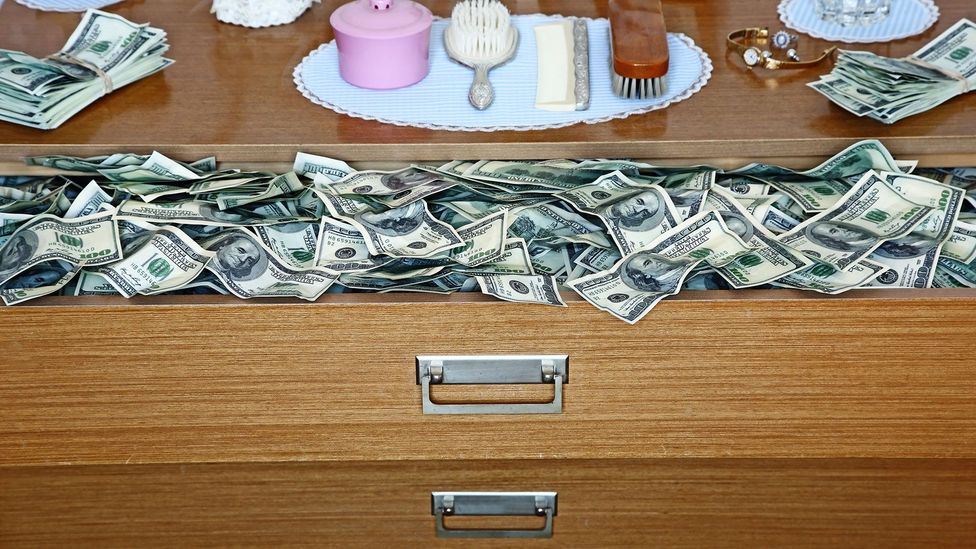
How much cash do you have stored in your home? (Credit: Getty Images)
So where does that leave us? "Until we have sufficient and reliable alternatives in place, it would be dumb to get rid of cash now," says David Wolman, author of the book The End of Money. "Honest people and legit businesses still rely on it." Instead of constant cheering or hand wringing about the word "cashless," people should be examining the trends that are pushing cash away. "It would be foolish to conflate enthusiasm about the impact of that marginalisation with unthinking cheerleading for cash's total demise," he says.
Many who think about cash like to use Mark Twain's quote: "reports of my death have been exaggerated." In one paper, the authors compare cash to a kind of Cinderella. "It doesn't have a mom or dad to watch over it – just those horrible stepsisters that try to convince Cinderella that she is ugly. But she isn't," they write. Cash is with us, and it will stay with us whether Bitcoin and PayPal advocates like it or not.
On that fall day in 2025 you may take a self-driving car to work, or hologram into the office, and you may not even touch a piece of paper money. But you'll likely still have a few notes and coins on hand somewhere, just in case. And you can be certain that somewhere in the world, somebody is pulling cash out of their pocket to buy something.
Follow uson Facebook , Twitter , Google+ and LinkedIn
Does It Cost Money To Close A Bank Account
Source: https://www.bbc.com/future/article/20150724-the-truth-about-the-death-of-cash
Posted by: lucaswastor.blogspot.com

0 Response to "Does It Cost Money To Close A Bank Account"
Post a Comment